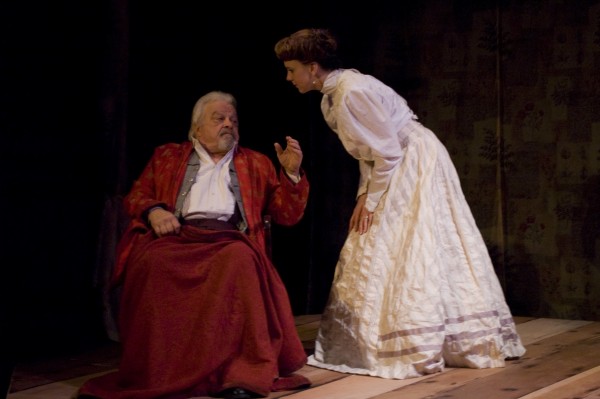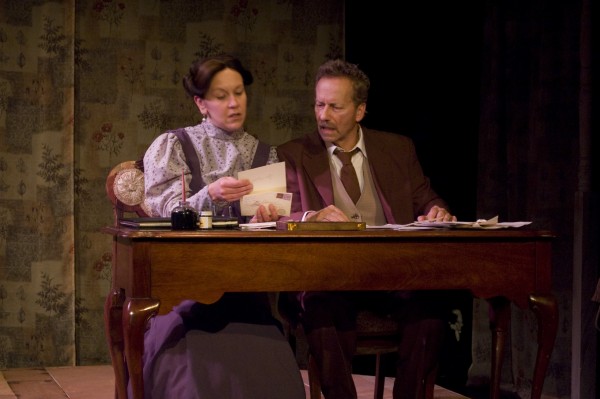
Weathervane Playhouse’s “Uncle Vanya” a journey through sadness and destruction
When you go to see Anton Chekhov’s “Uncle Vanya” that is being presented by Weathervane Playhouse, a Knight Arts grantee, you can’t expect to walk out of the theater whistling a happy tune. Chekhov’s story tells of an extended Russian family group that aren’t particularly likeable people, and who have generally (yet unwittingly) made a mess of things.
One thing about master playwrights, you can interpret their stories in a variety of ways and still uncover what’s at play in the work. In this one, you could look at their empty lives and the depleted estate out in the countryside as Chekhov noted, as an allegory of the destruction of beauty. The sets are drab and dark, and the huge estate, as described by one of the characters, country doctor Mikhail Astrov (played by Jim Fippin), is a forlorn wasteland.
You can also look from a religious angle. There’s enough lust, greed, envy and sloth to redefine the deadly sins. The moral ambiguity of some of the characters colors the sharp edges of feeling. The characters don’t grow in the action of the play; they seem rather to unfold, like a peeled-away onion, to expose the not always pretty selves they have become. The Uncle Vanya character (played disarmingly and touchingly by Alex Cikra) reveals his rage at the unfairness of his life while he worked and the retired professor and absent landlord of the estate, Alexandr Serebryakov and his young, attractive but notionless wife, Yelena, took all the revenue raised and spent it on their frivolous lives. Uncle Vanya at one point in Act II tries to off Serebryakov and in another scene pursues Yelena.
Dale Franks (Serebryakov) and Amanda Larkin (Yelena) in “Uncle Vanya.” Photo courtesy of Weathervane Playhouse
Playwright David Mamet’s translation and re-creation of the script heads in another direction – the idea of bad stewardship (in terms both of the life given them and the resources they have at hand). Dr. Astrov narrates the decline of the estate. With charts in hand, he shows how in their hands the forests have been decimated over the years, with the result that game animals and fowl have long left for better conditions. The herds of cattle have presumably all been slaughtered or sold. The overall result is that the surrounding villagers have disappeared as well, probably to cities in the hopes of eking out a life.
The condition of the property parallels the lives of the characters – all heading to nowhere. The idea is probably best seen in the character of Sonya Alexandrovna, the daughter of the professor (he was first married to Uncle Vanya’s sister). Described as plain (and made up to look that way and dressed in drab costumes, when the actress, Jen Klika, is actually quite pretty), Sonya wants nothing more than to marry. She is, in fact, the true heir of the place. Her chances, however, aren’t going to come. There are no heirs apparent. When this family goes, it all goes.
Jen Klika (Sonya) and Alex Cikra (Uncle Vanya) in “Uncle Vanya.” Photo courtesy of Weathervane Playhouse
Director Bob Belfance has an astute ensemble cast (with sparkles of performances coming from Cikra and Klika). Barbara Trotter, as Uncle Vanya’s mother, resonates her character’s voice with the ultimately empty idea that wealth has its privileges but not especially good priorities, as the state of the place shows. Marci Paolucci, as the nanny Marina, lends her religious voice that all will go on and work out in God’s plan, when it would appear that God, like the biblical character of Lot, hasn’t looked back in a long time.
Anton Chekhov’s “Uncle Vanya” will be performed at 7:30 p.m. on Thursday, 8 p.m. on Friday-Saturday, and 2:30 p.m. on Sunday through January 25 in the 48-seat Dietz Theater located in Weathervane Playhouse, 1301 Weathervane Lane, Akron; 330-836-2626; www.weathervaneplayhouse.com. Tickets are $18 ($5 for students).
Recent Content
-
Artsarticle ·
-
Artsarticle ·
-
Artsarticle ·

